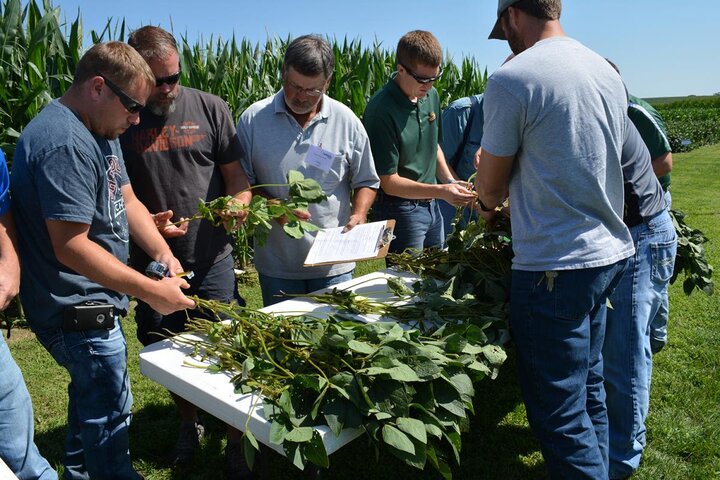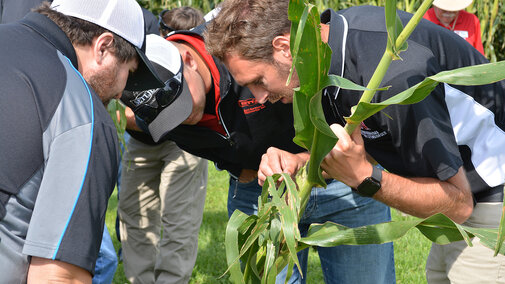Examine and work with corn and soybean plants from early vegetative to maturity growth stages at Nebraska Extension’s Aug. 22 Midwest Soybean Production Clinic and Aug. 23 Midwest Corn Production Clinic.
Agribusiness professionals and crop producers will get hands-on, in-field experience working with crop scientists to identify crop issues throughout the production cycle. They’ll be able to identify agronomic issues and key insect and disease pests at different plant growth stages and discuss management strategies based on university research.
"Whether you’re a rookie or a seasoned veteran in working with these two crops, I’m confident you will learn something new which you can take back to your business or farming operation to improve profitability," said Keith Glewen, extension educator and program coordinator. "We offer a money back guarantee of your registration fee if you’re not satisfied with the training."
Both clinics will be taught by University of Nebraska research, teaching, and extension faculty, and held at the University’s Eastern Nebraska Research and Extension Center near Mead. They are part of the University of Nebraska Crop Management Diagnostic Clinic Series. Participants will meet at the August N. Christenson Research and Education Building.
August 22 Midwest Soybean Clinic
Participants can examine fields to see why early soybean planting is a crucial first step to improving yield potential and how four seeding rates and four seeding depths impacted soybean emergence, plant branch numbers, and pod numbers at the lowest stem nodes. They’ll also examine disease, insect, and weed effects at different stages and best practices for taking sweep net samples.
Hands-on diagnostic work will also include some of our newest soybean pests. Small plots set up with different numbers of Japanese beetles will give participants experience in estimating defoliation. Information on the orange gall midge, an increasing pest in eastern Nebraska soybean this year, will be included.
Presentation and field demonstrations throughout the day will cover
- cultural practices;
- genetics/agronomics;
- insect management;
- plant pathology;
- soil fertility;
- irrigation; and
- five keys to successful weed science.

View more details in the program flyer. Registration begins at 8 a.m., followed by the clinic from 8:30 a.m. – 5 p.m.
August 23 Midwest Corn Clinic
Participants will dig plants and stage corn while exploring the differences between corn growth and development. They’ll examine the most critical development stages and what affects yield at these stages as well as how different hybrids react to the same weather conditions. Plots will also show how decisions about plant population can expand or cap crop yield opportunities. Participants will examine disease, insect, and weed effects at different stages. They'll be able to scout for European corn borer and fall armyworms at two states of development as well as infestations of aphids and mites.
Presentation and field demonstrations throughout the day will cover
- agronomy cultural practices;
- genetics/production;
- insect damage;
- plant pathology;
- soil fertility; and
- keys to successful weed management.
View more details in the program flyer. Registration begins at 8 a.m., followed by the clinic from 8:30 a.m. - 5 p.m.
Registration and CCA Credits
Registration begins at 8 a.m. both days and the clinics run from 8:30 a.m. to 5 p.m. Participants will meet at the August N. Christenson Research and Education Building at the university’s Eastern Nebraska Research and Extension Center near Mead.
A total of 8 Certified Crop Adviser credits (crop management – 2, nutrient management – 2, and pest management - 4) have been applied for and are pending approval for each clinic. Participants will earn 16 credits by attending both days.
Early registration is recommended to reserve a seat and resource materials. Cost for one clinic is $95 and cost for both is $150. There is a money-back guarantee for any registrant not satisfied with the training.
For more information or to register, contact the Nebraska Extension CMDC Programs, 1071 County Road G, Ithaca, NE 68033, call (800) 529-8030, fax (402) 624-8010, e-mail cdunbar2@unl.edu or visit https://enre.unl.edu/crop/

